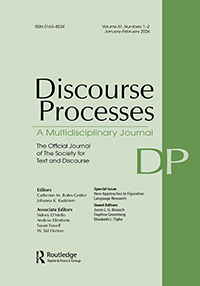Current issue
New Approaches to Figurative Language Research
Register now or learn more

Start a new submission or continue a submission in progress
Go to submission siteReady to submit? Start a new submission or continue a submission in progress
Go to submission site (link opens in a new window)Discourse Processes is an international multidisciplinary journal that publishes work related to comprehension, production, and processing of text and discourse, and related methodologies. Papers presenting either empirical data or theoretical ideas related to timely scientific and/or societal issues are welcome, especially multidisciplinary work that makes connections to real-world applications. We also welcome papers supporting different methodological (qualitative, quantitative, and mixed-methods traditions) and statistical advances as they are relevant to the field of text and discourse. We encourage submissions from scholars across the globe engaging in these types of work. Discourse Processes is associated with the Society for Text and Discourse, although authors are not required to be members of the Society to publish in the journal.
Types of Papers
Discourse Processes publishes regular articles, brief reports, brief reviews, pre-registered reports, commentaries, and letters to the editor.
Regular articles present novel empirical data, theoretical work relevant to scientific research, methodological advances, computational modeling, replication studies, and systematic and/or meta-analytic reviews. Length should be commensurate to the contribution, but manuscripts should generally not exceed 35 manuscript pages (double spaced, including abstract and references). Author affiliations, acknowledgments, tables, figures, and figure legends are excluded from the page limit.
Brief reports present novel empirical data, computational modeling, and methodological advances that relate to text and discourse. The maximum length of the brief report is 3000 words, excluding title, abstract, references, author affiliations, acknowledgments, figures and figure legends.
Brief reviews summarize recent empirical, theoretical, or methodological work on a specific topic. The maximum length of the brief review is 3000 words, excluding title, abstract, references, author affiliations, and acknowledgments.
Pre-registered reports present empirical work for which methods and proposed analyses are pre-registered and peer-reviewed prior to research being conducted. Protocols are then provisionally accepted for publication before data collection. This paper format is especially suitable for replication but also for novel studies. The first submission of a preregistered report contains: (1) an Introduction that motivates the research question(s) and hypotheses; (2) a Method section, which should provide a detailed description of the research methods; and (3) a data analysis plan.In this first stage, the paper will be evaluated on its theoretical contribution and empirical quality.The second submission contains Introduction, Methods, Results, and Discussion, and acceptance is not contingent on the findings. If the original protocol was not followed either in data collection or data analysis, this must be clearly indicated. The final acceptance of the paper depends on how well the conducted study meets the originally planned protocol.The page limit and/or maximum word count should align with the standards for regular papers (35 double-spaced pages) or brief reports (3000 words).
Commentaries are brief communications related to the papers published in Discourse Processes or other work relevant to the readership of the journal, and are meant for open communication between scholars.The maximum length of a commentary is 1500 words, excluding references.
Letters to the editor are open communications regarding timely topics and issues in the field or regarding the editorial policies of the journal. The maximum length of a letter to the editor is 1500 words, excluding references.
Special Issues and Forums
Discourse Processes publishes Special Issues and Forums on topics that are relevant to all aspects of text and discourse, and related methodologies. Special Issues and Forums are collections of papers on a specific topic or theme.Special Issues would fill an entire issue of the journal, whereas Forums would not necessarily fill a full issue of the journal.
Process for Submitting a Proposal for a Special Issue or Forum. Prospective guest-editors for a Special Issue or Forum should email a proposal (as a PDF or Microsoft Word Document) to the Editor(s)-in-Chief. The proposal should include the following components:
The Editor(s)-in-Chief will send the proposal to Associate Editors and/or Editorial Board members who have aligning expertise for feedback.This feedback will be provided to the prospective guest-editors, and the Editor(s)-in-Chief will make a decision whether to move forward with the proposed Special Issue or Forum.
Commitment to Equity and Diversity
Discourse Processes is committed to issues of equity and diversity. The journal welcomes and encourages article submissions that address issues of equity and diversity in discourse processing and discourse comprehension. We are also committed to increasing the participation of underrepresented scholars, in efforts to combat prejudice and discrimination in science and society. We seek the participation of underrepresented scholars on our editorial board, as reviewers, and as authors published in the journal. Please do not hesitate to contact us with questions or suggestions.
Authors can choose to publish gold open access in this journal.
Read the Instructions for Authors for information on how to submit your article.
Explore the most recently published articles
New Approaches to Figurative Language Research
Reach an engaged target audience and position your brand alongside authoritative peer-reviewed research by advertising in Discourse Processes.